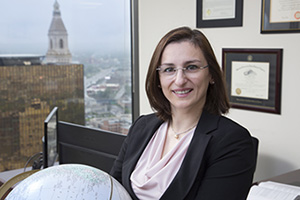- Apply
- Visit
- Request Info
- Give



Published on March 22, 2021

Immigration law was the topic of a virtual presentation at Eastern Connecticut State University by guest speaker Dana Bucin on March 17. Courtney Broscious, associate professor of political science, hosted Bucin, who serves as a comprehensive immigration lawyer at the Murtha Cullina law firm. Bucin has received many accolades, including being named to Connecticut Magazine’s “Forty Under Forty” list for 2019.
In her presentation, Bucin shared current immigration law with students, as well as the impact of the recent presidential election on immigration policies.
Starting with a brief explanation of immigration law, Bucin discussed the four major general immigration categories including business and employment, families of United States citizens and permanent residents, humanitarian and deportation efforts, and the diversity visa lottery.
Although most attorneys focus on one or two categories, Bucin said she covers all four areas, as her law firm has noticed that the four categories are related and relevant in many immigration cases she has. She also explained the typical path of gaining citizenship to the United States including examples of student visas, as they are of interest to college students pursuing a future career path.
In terms of work visas such as the H-1B, Bucin said that the demand from immigrants was far higher than the number of those accepted. Each year, the country allows 65,000 petitioners access, plus an additional 20,000 people for advanced degrees. However, within the first five days of the 2020 season, the United States received 275,000 H-1B petitions.
When explaining the stark contrast between visa demand and supply, Bucin said “we are living by 1980s standards.” She then said that China, India, Mexico and the Philippines were the countries with the biggest disadvantage. The average wait for a green card for a member of a profession holding advanced degrees or of exceptional working ability from India is 7-10 years, while from China it is 3-5.
Toward the end of her presentation, Bucin described the impact the Trump presidency had on immigration policy. “Before President Trump, I worked very few deportation services. Once Trump was in office, I was getting calls at all hours of the night,” she said. “I was pulled into this side of immigration like never before.”
She then described the day the executive order, “Protecting the Nation from Foreign Terrorist Entry into the United States,” also known as the Muslim Ban, was put into place. A client of Bucin’s was waiting for his wife and children, who were on a flight to the United States, when the ban was implemented.
Bucin described how she arrived at John F. Kennedy Airport to see a mass of lawyers waiting for their clients as she was. Bucin and several other lawyers spent their time at the airport writing out Habeas Corpus writs on their laptops and holding out signs with their clients' names. The writs were to challenge the deportation or imprisonment of their clients.
“I was walking with a sign back and forth with other attorneys,” Bucin said, describing how they waited two hours for their clients after the plane landed. Luckily, the American Civil Liberties Union (ACLU) had filed an injunction for those arriving at the time of the ban.
Explaining the direness of the situation, she told the Eastern students that if her client had returned to her country of origin, she would have been killed. Considering all possibilities to keep her client from returning, Bucin said she was ready to buy all the plane tickets to prevent anyone from boarding the flight back.
“There were many incidents that really marked me during the Trump presidency,” said Bucin as she described the many traumas experienced at that time. However, she has hope for new policies, and she thinks they can only get better.
Bucin ended her presentation by answering student questions, including what a typical day looks like as a lawyer, what the most important skills of an immigration lawyer are, how international laws impact her practice and advice for going into law school. “I think the most important thing you can give your client is empathy,” said Bucin. “Only get into the job if you’re the type of person who cares. That is my advice to you; have heart, have empathy, care about your clients.”Written by Molly Boucher